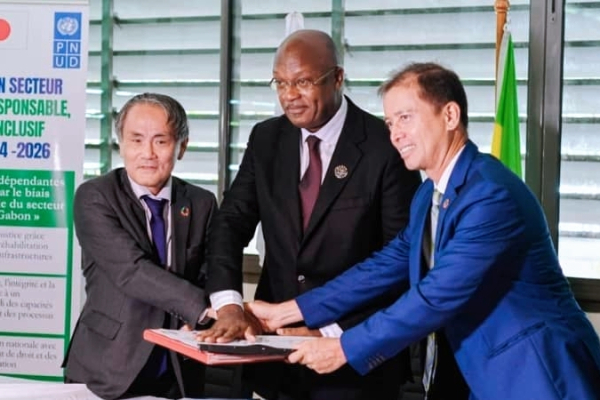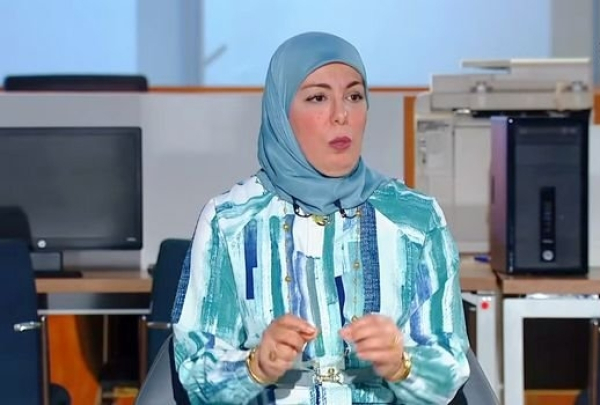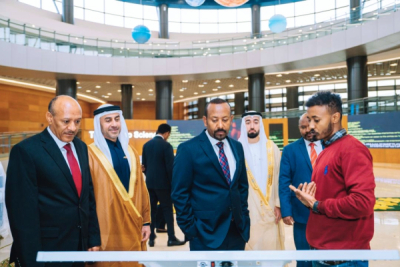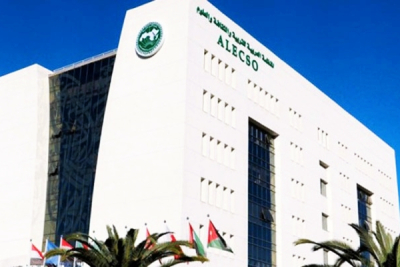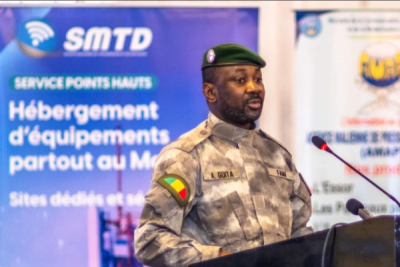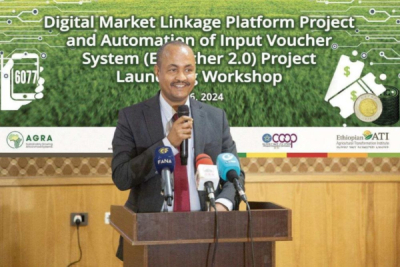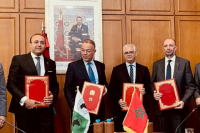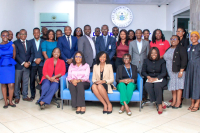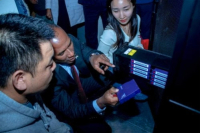
Public Management (597)
Gabon is currently one of the African leaders in the development of information and communication technologies (ICT). With the support of strategic partners, the country is undertaking the digitization of its judicial sector.
Gabon has obtained a ¥331 million (about $2.2 million) grant from Japan to modernize its judicial sector through digital technology. According to a release, dated Junly 29, from the justice ministry, the project will be carried out in partnership with the United Nations Development Programme (UNDP).
“This is a process we began with a symposium last November. The signing of this aid agreement will allow us to achieve our goals for the justice system in our country,” Justice Minister Paul-Marie Gondjout (photo, center) said.
The initiative aligns with Gabon’s “Gabon Digital” strategy, which aims to establish the country as a Central African hub for the digital economy. In June, the government approved a €56.2 million ($61 million) loan from the World Bank to finance the broader strategy.
Gabon ranked 10th among African countries with a score of 74.7 out of 100 in the 2024 ICT Development Index published in the "Measuring Digital Development: The ICT Development Index 2023" report by the International Telecommunication Union. This score improved from 72.9 in the 2023 edition of the report.
Adoni Conrad Quenum
In recent years, the Algerian government has prioritized accelerating the digitization process. To guide this transformation, the country is developing a comprehensive roadmap.
Algeria is set to implement a new digital transformation strategy, High Commissioner for Digitization Meriem Benmouloud said on Monday. The final draft was submitted to President Abdelmadjid Tebboune for approval in June.
The strategy, a first for the North African nation since independence, aims to shift from paper-based to digital management, increase transparency, reduce bureaucracy, broaden access to information, and boost economic performance while maintaining service quality.
The five-year plan, ending in 2029, is built on two pillars: a forthcoming digitization law and information and cybersecurity. The law will establish a regulatory framework for the digital sphere, streamline bureaucracy, and address technological gaps. The government will partner with the Ministry of National Defense to strengthen information and cybersecurity.
Tebboune has championed the digital transformation project as a driver of sustainable local development. Launched in 2019, the initiative has made significant progress in the past two years to overcome resource constraints, bureaucratic hurdles, and sector complexities.
Algeria's ICT development has accelerated, according to the latest International Telecommunication Union report. The country jumped 14 places in the ICT Development Index, ranking 88th out of 169 nations. Its score of 77.8 points surpassed African (47.4), Arab (74.5), and middle-income country (62) averages.
Samira Njoya
In the face of the digital revolution, African nations are ramping up initiatives to equip their populations, particularly young people, with essential digital skills. Mastering these competencies is becoming increasingly indispensable in today's world.
On Tuesday, July 23, Ethiopian Prime Minister Abiy Ahmed (photo, center) launched the "5 Million Ethiopian Coders" program. Supported by the United Arab Emirates, this initiative aims to provide digital training to 5 million young Ethiopians, including 50% women, by 2026.
The training program focuses on areas such as programming, Android app development, data science, and fundamental digital skills in artificial intelligence. It will last between 6 and 7 weeks and will culminate in certification for participants.
"Ethiopia has hope through a forward-thinking youth population. The 5 Million Ethiopian Coders Initiative we launch today is a great opportunity and I call upon everyone to encourage the youth to register for the program, gain skills, and acquire international certification," wrote Prime Minister Abiy Ahmed on X (Formerly Twitter).
This initiative is an adapted version of the "One Million Arab Coders" program conducted in Dubai and initiated at the 2017 World Economic Forum by Sheikh Mohammed Bin Rashid Al Maktoum, Vice President, Prime Minister, and Ruler of Dubai. The Ethiopian version of the program is part of the "Digital Ethiopia 2025" plan, aimed at leveraging digital opportunities to propel the country towards a knowledge and innovation-based economy.
With over 128 million inhabitants, a significant portion of whom are young, Ethiopia faces a digital divide that prevents its population from reaping the benefits of digital growth. In the era of the technological revolution, the country must equip this young generation with the necessary skills for future jobs.
Adoni Conrad Quenum
Information and communication technologies (ICT) are now an essential part of modern education systems. An international organization headquartered in Tunisia is backing government initiatives to further integrate ICT into schools.
The Arab League Educational, Cultural and Scientific Organization (ALECSO) announced on Friday the donation of 2,000 tablets and 20 computers to Tunisia. This initiative aims to bridge the digital divide in education by equipping students and teachers from low- and middle-income communities with internet-connected devices.
The breakdown of the donation allocates 1,500 tablets and 15 laptops to the Ministry of National Education, while the Ministry of Family, Women, Children, and the Elderly will receive 500 tablets and 5 laptops.
Mohamed El Jemni, ALECSO's Director of the ICT Department and project coordinator, reaffirmed the organization's dedication to fostering digital solidarity. He emphasized ALECSO's commitment to ensuring equal access to learning opportunities and supporting countries in navigating the current global challenges and significant digital transformations.
This donation aligns with the growing importance of information and communication technologies (ICT) in education. Stakeholders across the educational spectrum are increasingly embracing these tools to enhance the quality of learning. Tunisian authorities are also actively pursuing similar initiatives, including the implementation of a digital strategy within the Ministry of National Education.
Adoni Conrad Quenum
African countries fully recognize the benefits that digitization can bring to their economies. They are now committed to seizing these opportunities with determination to maximize the advantages.
Last Friday, July 19th, Colonel Assimi Goïta (photo), President of the Malian Transition, launched the first phase of a program that allows citizens to pay for certain services using their mobile phones.
This initiative, unveiled in President Goïta's speech on June 22nd, 2024, in Sikasso, marks a turning point in Mali's administrative landscape. Initially deployed in the capital city of Bamako, the program will eventually expand to encompass all regions and diplomatic missions. Additionally, the scope of services covered will progressively include taxes and public procurement.
"This initial phase represents a cornerstone. It will be gradually extended to all regions of Mali and diplomatic representations, while progressively integrating all public services, including taxes and public procurement," indicates a presidential statement.
The mobile payment system aligns with a broader vision for Mali's development and modernization, where technological innovation takes center stage. The program aims to streamline administrative procedures, expedite processing times, and optimize the collection of public revenue. Furthermore, it seeks to enhance citizen trust in public institutions by fostering a more transparent and efficient management system.
Mali has historically lagged behind in digitizing public services. In 2022, the United Nations' E-Government Development Index ranked the country at 178th globally. This new initiative, therefore, represents a critical step towards closing the gap and ushering in a more modern administrative system.
Samira Njoya
Ethiopian authorities are aiming to capitalize on their agricultural sector by modernizing it. To achieve this, they are implementing projects to digitize the sector.
The Ethiopian Agricultural Transformation Institute (ATI) on Tuesday launched two digital initiatives in partnership with the Alliance for a Green Revolution in Africa (AGRA) to enhance agricultural input and output market systems.
The first project involves the creation of a digital platform that will connect smallholder farmers with potential buyers. "This initiative modernizes the agricultural market system, improving price discovery, risk management, and transaction transparency. It ensures a consistent supply of quality products, promotes traceability, matches supply with demand, and stabilizes market prices," explained the ATI.
The second project focuses on automating the input voucher system. The ATI is introducing eVoucher 2.0, electronic vouchers with a digital code that can be used to purchase goods or services online or in stores. The adoption of this system is expected to enhance the distribution of agricultural inputs and combat fraud.
These projects are part of a broader effort by Ethiopian authorities to modernize the agricultural sector. They have signed various partnerships to achieve this goal, confirming their intention to leverage technology for agricultural advancement. In June, the ATI partnered with Digital Green, a U.S.-based organization promoting the digitization of agriculture, to develop a knowledge-sharing platform.
The launched projects will help ensure a sustainable market, improve the supply of inputs to farmers, and strengthen the connections between farmers and agricultural product consumers.
Adoni Conrad Quenum
In recent years, Morocco has embarked on a digital transformation, marked by the modernization of various sectors, including higher education. With the support of partners, these advancements are becoming increasingly tangible.
Morocco secured a €120 million loan from the African Development Bank (AfDB) to digitize its universities, according to a financing agreement signed in Rabat on Tuesday, July 16.
The agreement was signed by Achraf Hassan Tarsim, AfDB's country manager for Morocco, and Nizar Baraka, Morocco's Minister of Higher Education, Scientific Research, and Innovation.
The funds will be used to develop and implement new university training programs in digital fields. These programs will be tailored to meet job market needs and the expectations of national and international investors. Additionally, universities will be equipped with new computer hardware and their services will be digitized.
This €120 million loan is part of a larger €604 million AfDB financing package for Morocco. The other allocations include €200 million for the Territorial Competitiveness Improvement Program, €200 million for the construction of the 104-kilometer Guercif-Nador highway and €84 million for the Integrated and Sustainable Development Support Project for Forest Areas.
The Moroccan government views this investment in university transformation as key to achieving the goals of its Plan for Accelerating the Transformation of the Higher Education, Scientific Research, and Innovation Ecosystem (ESRI 2030). Launched in 2020, ESRI 2030 aims to create a high-performing and attractive higher education system aligned with the country's needs. It emphasizes incorporating entrepreneurship into curricula and promoting excellence and innovation.
Morocco has set ambitious targets: graduating 22,500 students annually by 2027 and increasing the number of graduates with digital specializations or competencies across all disciplines and levels to 50,000 by 2035.
Samira Njoya
As part of the digitalization of various sectors, Algerian authorities have made significant strides in human resources management.
The Algerian Ministry of the Interior, Local Authorities, and Territorial Planning has completed the digitalization of administrative documents related to human resources management at both central and local levels. The announcement was made in a statement released on Saturday, July 13.
"This initiative has resulted in the digitalization of 25,792,410 documents, including those of senior executives, employees, contract agents in service, and retirees. These documents are organized into 735,926 electronic files, each containing 35 digitized documents," the statement reads.
Additionally, the ministry developed a decision-support system for human resources management, called "system power BI." This system utilizes data from the integrated and comprehensive Human Resources Information System (HRIS) to provide precise and real-time data analysis, as well as a forward-looking perspective in decision-making related to human resources management.
The acceleration of digital transformation in Algeria aligns with the directives of President Abdelmadjid Tebboune. Aiming for full digitalization of the country by 2034, the authorities are undertaking numerous actions across various sectors as part of the 2024-2029 digital transformation strategy.
The initiative is expected to enhance the efficiency and productivity of human resources services in state entities by reducing human errors and document processing delays, improving transparency and accountability within organizations and the government, eliminating phantom employees, and facilitating citizen access to services such as social benefit applications, payroll information consultation, and leave requests.
Adoni Conrad Quenum
Fueling the continent's ongoing technological revolution, African nations are actively pursuing initiatives to bolster their digital security.
The Ghanaian Cyber Security Authority (CSA) issued licenses and accreditations to 51 entities operating in the digital security space on July 10th. This move aims to establish a regulatory framework for Cybersecurity Service Providers (CSPs), Cybersecurity Establishments (CEs), and Cybersecurity Professionals (CPs) authorized to offer digital security services in the country.
"Today’s ceremony is not just a culmination but a catalyst for continued collaboration and innovation in our cybersecurity ecosystem. The synergy among CSPs, CEs, and CPs will drive us towards adaptive resilience and continuous improvement," said Adelaide Benneh-Prempeh, a member of the CSA Board of Directors.
The licensing initiative comes amidst a rising tide of cyberattacks across Africa. The continent's rapid digital transformation has increased its vulnerability, making robust cybersecurity a priority for governments. Ghana has taken steps by establishing a national strategy through the "Ghana National Cyber Security Policy & Strategy" and implementing the Computer Emergency Response Team (CERT-GH). This team plays a vital role in real-time threat monitoring and coordinating responses to major cybercrime incidents.
The country has also ratified the African Union Convention on Cyber Security and Personal Data Protection. It has deposited the instruments of accession to the Budapest Convention on Cybercrime.
In terms of cybersecurity preparedness, Ghana ranks third in Africa with a score of 86.69 out of 100, according to the 2021 "Global Cybersecurity Index" published by the International Telecommunication Union. This places the nation ahead of Nigeria (84.76) but behind Tanzania (90.58).
Adoni Conrad Quenum
Madagascar's customs services have launched a strategic plan for their digital transformation, partnering with various stakeholders to meet their objectives within the set timelines. This initiative aims to modernize customs operations, enhance efficiency, and streamline processes through the adoption of advanced technologies.
Last week, the Directorate General of Customs (DGD) in Madagascar inaugurated a data warehouse, a database management system designed for data storage and analysis. Funded by the Korea Customs Service, this infrastructure will enable long-term storage, combination, and archiving of data from various sources.
"Malagasy customs is progressing towards a performance-driven process where KPIs or key performance indicators are the guiding principles for the future of the administration. [...] We envisioned a future where customs decisions, including value assessments, temporary admissions, tariff groupings, and advance rulings, would be validated through a digital and rapid process designed to better serve users," said Ernest Zafivanona Lainkana, Director General of Malagasy Customs.
This initiative is part of the modernization and digitization of Madagascar's customs services, following a partnership signed on August 30, 2022, between the government of the Republic of Korea and the DGD. The aim is to support the DGD's strategic plan (31 projects) by funding three projects with a total of $5,163,000 over four years.
The data warehouse's capacity will allow the centralization and consolidation of all sensitive and strategic customs data over a period of 50 years. Additionally, the data center housing the infrastructure ensures continuous operation of new applications and has the potential to accommodate additional racks and servers.
Adoni Conrad Quenum
More...
Douala's city services are going digital, and now it's the moto-taxi industry's turn. This push to modernize the transportation system aims to improve safety, streamline operations, and make things easier for both drivers and passengers.
In a press release issued on Wednesday, July 3rd, the Douala City Council announced a digital registration program for the city's moto-taxi drivers. This initiative aims to combat insecurity and help residents distinguish legitimate moto-taxis from potential criminals.
"We've collaborated with the administration to ensure a smooth digital registration process for our members," said Simplice Tabate, head of moto-taxis in Douala's Fourth District. "Following this launch, we'll replicate this approach in the Fourth District and other areas."
This program aligns with Cameroon's Digital Plan 2020-2025, which promotes digital technology as a driver of economic and social development. Douala has actively embraced this strategy, having digitized its parking system in November 2021. Earlier this year, the city launched a digital platform to attract investment from Cameroonian expatriates into the economic capital.
Starting July 11, moto-taxi drivers can register by presenting their national ID card, a valid category A driver's license, and their vehicle registration card. Inspections to verify registrations will commence on September 15.
The digital registration program aims to enhance safety and order within Douala. The platform will create a verified database of drivers, ensuring only authorized individuals operate moto-taxis in the city. This initiative reflects Douala's commitment to utilizing digital technology for improved public services and urban management.
Adoni Conrad Quenum
The Burkina Faso government is stepping up its efforts to improve cybersecurity. They're launching several initiatives to make their digital infrastructure more resilient and protect sensitive data from cyberattacks.
urkina Faso's Transitional Legislative Assembly (ALT) unanimously adopted the Information Systems Security Act on Tuesday, July 9. This new law establishes a legal framework to protect information systems, aiming to reduce vulnerabilities for public administrations and economic development units.
According to the Minister of Digital Transition, Posts, and Electronic Communications, Aminata Zerbo/Sabane (photo), the law is particularly important in the ongoing digitization process in the country. “We are firmly committed to dematerializing administrative acts and procedures to modernize, enhance productivity, transparency, and accessibility for all users. Further initiatives are underway to make digital technology a lever for our socio-economic development,” she stated.
This move reflects the government's focus on strengthening national cybersecurity amidst rapid digital transformation. The country is experiencing a surge in electronic communication services and cyberattacks, further amplified by the ongoing security crisis.
The law strengthens the National Agency for Information Systems Security (ANSSI), established in 2013 to address cyber vulnerabilities. It will not only support ANSSI's operations but also ensure its effective collaboration with other technical actors within the digital ecosystem.
The adoption of this Act marks a significant step for Burkina Faso in securing its digital infrastructure. By enhancing the country's cyber resilience, the law aims to build a safe and reliable digital environment for both citizens and economic actors.
Samira Njoya
The initiative aims to facilitate investments from members of the Cameroonian diaspora in their hometown and encourage economic contributions from Cameroonians living abroad, fostering development and growth in Douala
The Urban Community of Douala (CUD), the Douala's municipal government, unveiled its digital platform, icud-diaspora, on Wednesday, June 26, following the establishment of a framework for exchanges with the diaspora in December 2022. This initiative aims to encourage Cameroonians living abroad to invest in the country's economic capital.
"We took the time to analyze key insights, such as the unanimously expressed demand from our diaspora to establish digital bridges to better harness opportunities in Cameroon. Through this platform, we want to offer skills, networks, and relationships that will enable our diaspora to invest in Douala and help us meet the city's social demands," explained Douala's mayor, Roger Mbassa Ndine.
The icud-diaspora platform allows Cameroonian migrants to declare their projects for Douala with just a few clicks and propose their expertise. In return, the city government promises to offer public-private partnerships (PPP), a dedicated remote contact person, project assistance, online services, a network of approved providers, and land availability.
According to a diaspora consultation conducted by the CUD between June and August 2023, 72% of the 445 respondents are willing to invest if conditions are met, 49% desire a dedicated intermediary to facilitate their projects, and 81% prioritize the quality and reliability of information. The consultation identified main barriers to diaspora engagement, including economic, social, and political conditions, bureaucracy, lack of incentives, and a deficit of trust and knowledge about opportunities.
Currently, the CUD offers a dozen opportunities to the diaspora in infrastructure and urban planning, such as developing residential or commercial real estate projects, constructing and operating supermarkets, among others. Roger Mbassa Ndine emphasized, "It's about co-constructing Douala's development with Cameroonians abroad who are a strength for our country."
Remittances from the diaspora are significant for the national economy. According to the World Bank, remittances from Cameroonian migrants to their home country amounted to $365 million in 2022, an increase of about 5% compared to $350 million in 2021. Douala aims to leverage these funds to drive its development.
Frédéric Nonos
In July 2022, Togo set a goal to digitize 75% of its administrative procedures by 2025.
Togo and Kazakhstan are strengthening their cooperation in the digitalization of public services. Togo's government agency, Togo Digital Agency (ATD), has formed a strategic partnership with Kazakhstan's National Information Technologies (NITEC). According to Togo First, this partnership will enable ATD to leverage NITEC's resources and expertise for its digital projects.
"This partnership will allow ATD to benefit from NITEC's expertise on various subjects to accelerate the digitalization of public services and administrations," stated the Togolese agency.
This initiative is part of the efforts to strengthen diplomatic relations between the two countries, particularly following President Faure Gnassingbé's visit to Kazakhstan. NITEC, ranked 28th on the E-Government Development Index and 8th on the UN's Online Services Index, is expected to bring its expertise to Togo, helping the country deploy advanced technologies to improve its public services.
It is worth noting that Togo aims to digitalize 75% of its public services by 2030.
Ayi Renaud Dossavi


